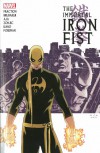A Spoopy Love Affair With Books
Jean, 39, lover of sci-fi, horror and fantasy, reader of comic books, conqueror of genre fiction.
Currently reading
Review: Tiger Lily

This was a difficult book for me. I've been fascinated by Tiger Lily, as a character, since youth, and the idea of a book based from her point of view? Fantastic! But the book itself is a mixed bag. You know the expression, 'Too many chefs ruin the soup?' Too many ingredients can as well, as this book shows off too well.When you begin to realize that it's gimmick layered upon gimmick... Well, I came to terms with it, but that's when I started to see just what was bothering me about it. Don't get me wrong: The book is beautifully written, the reason it very nearly got three stars out of me, and contains some fabulous characterization and reinterpretation of characters like Hook and Peter.
Problem the first: The narration. Second person narration has to be the most difficult undertaking an author can challenge themselves with, and it's only been successful a handful of times. Here, it's intrusive. From Tinkerbell's POV, you often forget that it's not third person since it's largely just observations of Lily and Peter until Tink will put in a jarring comment about drowning in a dew drop or eating a lightning bug or some other whimsy equally as out of tone with some of the darker elements of the book. One is left wondering: couldn't it have just been in omniscient third person narration. I suppose it was meant to develop Tink, but it just made me wish she'd go away, and that I knew more of what Lily was actually thinking.
Second problem: The book is about Lily, but we actually get very little insight into her as a person. We know that she's Not Like Other Girls, which makes her Important, and Better. But with a reserved personality, a narrator outside of Lily's own mind can't bring any complexity to her whatsoever other than showing her as distant, or mentioning that her mood was dark or conflicted. In the end, I didn't learn very much about her, nor did she seem particularly compelling, to have an entire book written about her.
And am I the only one who sees a problem in relating the tribe seen in Barrie's work with actually Native Americans, especially since this book takes place on an Island close to England? It's always been a thin line to walk with the source material, but making it purely Native culture shows off more glaring inaccuracies and stereotypes than going with something more ambiguous would have done. And, wait, they're fantastic and sexually liberated because they accept a transsexual man as their shaman, but still force Lily into a marriage with a dumb, sexually abusive man not of her choosing? Hm, there seem to be discrepancies here.Third: Re-imagining Neverland. It takes on more of a real, grounded appearance and life here, with the characters coming and going from England, and most of them having arrived by shipwreck. If a book only sought to re-imagine Neverland, it would have been a long and grueling task to convince the reader to go along with it, but here the author just throws it in and expects it to be accepted. This was, curiously, also in my opinion the strong point of the book.
Fourth: Romance. Yes, let's age both Peter and Lily up so instead of playmates, they can paw at each other like a stereotypical YA couple. It brought down even the fantastic characterization of Peter, IMO, and felt out of place within the thematic elements of the rest of the novel.
Fifth: Oh, female complications. This book allegedly takes an enlightened point of view on the complications that arise when characters mix. And yet Wendy is still frivolous and silly, and the other girls are still pitted against her, though Tink has to point out that, obviously, she's not jealous, that's just Wendy projecting her own high sense of self-worth, she's really just rooting for Lily, who's by far superior because she's fierce and a fighter etc. etc. Not Like Other Girls, Tomboy vs. Girlie Girl, all of these unpleasant tropes were in full force.
So, what did I like? The Victorian setting is fabulous (for characters like Hook and Smee, who are meant to be timeless; I'm aware that the other characters ARE Victorian), as is the very dark characterization of the pirates, and the modernized ADHD personality of Peter. The prose is beautiful but economic. All of which leads me to sadly conclude that this book could have been so much more, a mini-masterpiece, if it had avoided more of the YA cliches and tropes that it so easily fell into.









